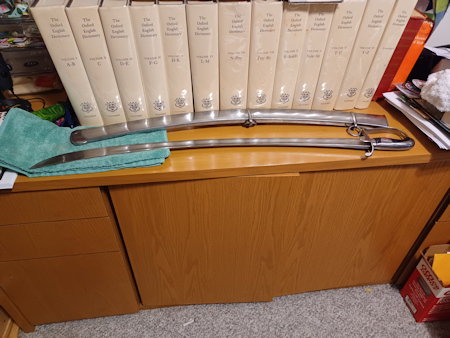Nov 11
Blades
Posted: under Background, Horngard, Life beyond writing, Research, the writing life.
Tags: Background, Life beyond writing, research, the writing life, weapons November 11th, 2023
Writing about sword-wearing, sword-using characters, and then handling some antiques owned by others, pushed me to indulge my own long-term interest in blades. Some of mine are blades I used in fencing lessons (with SCA instructors) and those have been more or less permanently blunted. I bought a bated (blunted from birth, so to speak) longsword when I needed to see what it felt like to carry, how hard it was to handle in indoor spaces and in the woods, etc. It was very helpful to get that physical feel of it, especially walking around and through ordinary obstacles. I have a few sharps, on which I practiced slicing things and poking things to see what it felt like (and also because it’s fun to slice the bottom lumps off 2 liter plastic bottle hanging from a tree limb when it’s full of water and the water squirts out and…yeah. Juvenile fun with swords.) But all of it (including the spear, the bill, and some other more period bits I have) have contributed a lot to scenes in which someone is doing something with a sword, spear, bill, etc. When I borrowed a scythe and scythed some tall grass, that was another experience that enhanced my writing about Gird. Same with the crossbow. No amount of just reading or watching movies or videos can provide the body-feel of handling things yourself, whether it’s kneading a loaf of bread, digging a ditch, riding a horse, knitting a sock, or…using a weapon.
I was gifted a gorgeous USMC Mameluke officer’s sword by friends who knew I hadn’t been able to get one at the time, but I don’t “play” with it…it needs sharpening (barely sharp now) by someone more expert than I am. It has a curve, and it’s definitely a weapon, not just a display item.
But as the Paksworld books have progressed, and I’ve studied more about swords, I’ve wanted to add a lighter-armed cavalry type to the mix in some areas. And I’ve long wanted a curved blade that I didn’t feel as protective of, as I do my dress sword. I have a character now, in Horngard I and II, Nasimir Clart, owner/commander of Clart Cavalry, who is a quintessential cavalry man, familiar since Xenophon wrote about horse training and cavalry operations in ancient Greece, and described vividly (for the 19th century) in the excellent series of books by Allan Mallinson, about a young officer’s career through the Napoleonic wars and beyond. And I could not envisage Clart without seeing someone with lance and saber.
So when Matt Easton of Schola Gladiatoria, one of my online sources of info on antique weapons and fighting styles, had a review of a reproduction of the 1796 pattern British Light Cavalry saber that he thought got all the details right, right down to the distal taper of the blade…I was hooked. It is a substantially “beefier” blade than the Mameluke, much wider and heavier, with a deeper curve, trading grace, speed, and ease of maneuver for power. So here it is, side by side with its scabbard.
I’m reasonably sure Nasimir Clart chose a different hilt…something he would find more stylish that also gave more hand protection than the simple knuckle-bow here. But for me, this will do just fine. It was getting dark by the time I got back from feeding the horses this evening…discovered it on the porch on the way out…so I didn’t have time after unboxing it to change into something more appropriate to take a picture of the first swings with it, but yes…I took it outside (it’s WAY too big to swing around inside) and found the balance strange in one way but quite nice once I started swinging it from the position to cover the back to various cuts in front. This is a saber for serious cavalry combat in the lightly-or-no-armored style. I will be doing things with it, for the same reason I used the others…it’s research. That it’s also fun and good exercise is beside the point. I absolutely did not buy a saber for the fun of it. (Stop laughing, you there in the back.)

